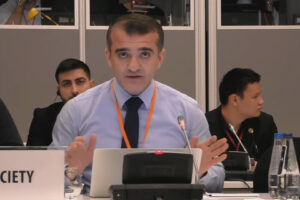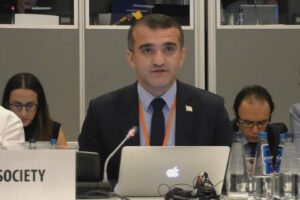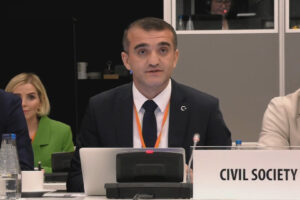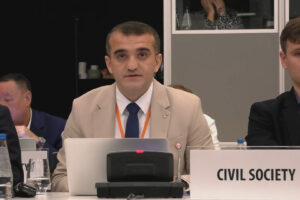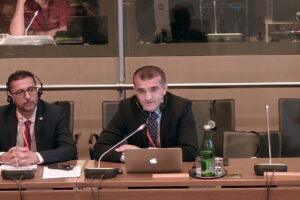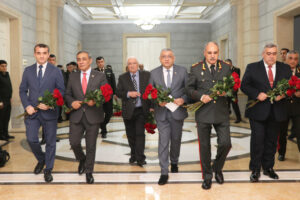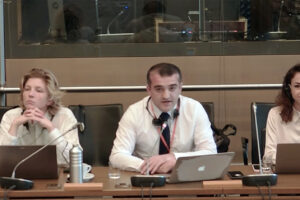“Currently Qatar is capable of ensuring human rights not only for the Arab region but also for the whole Islam world” – Ahmad Shahidov

Qatar National Day is a national commemoration of Qatar’s unification and independence and is celebrated on December 18 every year. This day is associated with founder of the State of Qatar Sheikh Jassem bin Mohamed bin Thani’s arriving at the office on December 18, 1878.
Presently Qatar is one of the world’s rapidly developed and modern countries with the population of 1 800 000 people. On the occasion of Qatar’s National Day Ahmad Shahidov, Head of the Azerbaijani Institute for Democracy and Human Rights (AIDHR) made a statement. Head of AIDHR who has close ties with Qatar pointed out his viewpoints in this respect:
– Mr. Shahidov, firstly we would like to get your opinions with respect to Qatar. Briefly, what you can say about Qatar?
Qatar is a country that locates in the Arabian Peninsula. Halul, Sharoh and Al-Asshat are the most strategic islands of the country. As Qatar is primarily an Islamic country that occupies 11, 521 square km, it’s governed with the Islamic rules and Shariat (set of Islam based rules) constitutes main legislative base. Beyond this, Qatar is a modern and highly developed country. English is the most frequently spoken language together with an official Arabian language. The clear cut reason of this is Qatar’s being the world’s centers of science, education, culture, sport and business.
– In majority of Arabian countries, Islam based education outweighs secular education. What about Qatar?
It would be inappropriate to apply this to Qatar. Because having the Islam principles in the heart of its establishment Qatar prioritized the arrears of science and education. Public education was established in the State of Qatar in 1952 and since then the Government launched the “Education for a New Era” initiative with the aim to involve advance technological means in the education field. Along with the religious schools there are leading educational institutions in Qatar such as Weill Cornell College of Medicine, Virginia Commonwealth University, Carnegie Mellon University, Texas A&M University, Georgetown University: School of Foreign Service (SFS Qatar), North Western University, College of the North Atlantic, Stenden University. These very educational institutions turned Qatar into sciences and education centers not only in Arab region but also throughout the world. It’s remarkable success for a small country.
– Mr. Shahidov, as a human rights advocate, how do you assess the state of human rights in Qatar? Typically, in the Arabian countries women rights are severely violated, they were restricted to participate in the society, sometimes their rights are even do not recognized.
I would say the opposite about Qatar. This country is a modern and sufficiently free. Women rights are fully secured in the country. It’s not a coincidence that first lady of Qatar Sheikha Mozah is one of the leading public figures of the country. She is an initiator of grand educational, scientific and cultural projects.
Being Chairwoman of Qatar Foundation for Education, Science and Community Development Sheikha Mozah implemented number of huge projects aiming at approximating country’s standards to the leading world countries. She has considerable role on building up international relations of Qatar. Nowadays, Qatar is known in an international space due to Sheikha Mozah endeavors. Isn’t that clear evidence of importance given to the women in Qatar?
-Nowadays, Arab region faces wars, conflicts, mass human rights violation. It turned to occur so frequently in Iraq, Syria, Palastine, Sudan, Nigeria and other countries. Which measures are taken by Qatar in order to build peace in these countries?
Unfortunately, the existing situation is deteriorated in the countries that you mentioned. In fact, lasting conflicts in the Arab countries need to be regulated by the UNO and peace to be established. However, at present UNO can not function efficiently in this regard. To put in another way, UNO performs better if it serves to the interests of some forces. As for instance, UN Security Council passed four resolutions on immediate withdrawal of the Armenian forces from the occupied Azerbaijani territory, however, these resolutions are not fulfilled yet. The same we can apply to Arab region since UNO is doing nothing in favor of these countries.
Presently, Qatar, Saudi Arabia, United Arab Emirates and Kuwait are the leading once among the Arabian countries. Above mentioned countries possess influence over the UNO. I would like particularly emphasize Qatar’s stance and its activities in this respect. By converting rich resources into human capital Qatar became centers of science, education, culture, sport and business of the world. Almost everyday Qatar, the capital city hosts groundbreaking international events, competitions and important conferences.
Remarkable achievements have been made by Doha in the international politics. It’s prerequisite to make use of potentials of Qatar in terms of regulating chaotic situation in the Arab region, securing peace and reconciliation. Through the guidance of Doha peace can be established in the Arab world.
– How do you thing, is Doha capable of this?
I assure you that it can do it. Let me recall my attendance the conference titled as “The International Conference on The Challenges to Human Rights and Security in Arab Region” organized by Qatar’s National Human Rights Committee in cooperation with the UNO in Doha, Qatar on November 5-6. The conference featured a series of discussions on the recent situation in Arab region. High level conference also saw discussions with respect to current and future perspective of Arab region. I once again familiarized myself with initiations and intentions of Qatar in the frame of the conference. As a consequence, I reached such a conclusion that Qatar is ready, I would say able to extend its support on ensuring peace and brotherhood not only in the Arab region but also all over the world since Qatar has the influence both in Arab region and international space.
– In the end, briefly what can you say about the relations between Azerbaijani Institute for Democracy and Human Rights (AIDHR) and Qatar?
Qatar is the second Arab countries that I paid a visit. Previously I was in Saudi Arabia. I found Qatar more open to development and multicultural backgrounds. As AIDHR we built up close relations with Qatar’s National Human Rights Committee. During my meeting with Dr. Ali Bin Samikh Al-Marri I noted our organizations intention on close collaboration and received positive respond. Negotiations are underway with regard to details of the upcoming collaboration and I do believe that in 2015 we will be able to launch cooperation with Qatar. We view Qatar as close and strategic partner.
Press Office of AIDHR
“Currently Qatar is capable of ensuring human rights not only for the Arab region but also for the whole Islam world” – Ahmad Shahidov
 15 December 2014
15 December 2014
Qatar National Day is a national commemoration of Qatar’s unification and independence and is celebrated on December 18 every year. This day is associated with founder of the State of Qatar Sheikh Jassem bin Mohamed bin Thani’s arriving at the office on December 18, 1878.
Presently Qatar is one of the world’s rapidly developed and modern countries with the population of 1 800 000 people. On the occasion of Qatar’s National Day Ahmad Shahidov, Head of the Azerbaijani Institute for Democracy and Human Rights (AIDHR) made a statement. Head of AIDHR who has close ties with Qatar pointed out his viewpoints in this respect:
– Mr. Shahidov, firstly we would like to get your opinions with respect to Qatar. Briefly, what you can say about Qatar?
Qatar is a country that locates in the Arabian Peninsula. Halul, Sharoh and Al-Asshat are the most strategic islands of the country. As Qatar is primarily an Islamic country that occupies 11, 521 square km, it’s governed with the Islamic rules and Shariat (set of Islam based rules) constitutes main legislative base. Beyond this, Qatar is a modern and highly developed country. English is the most frequently spoken language together with an official Arabian language. The clear cut reason of this is Qatar’s being the world’s centers of science, education, culture, sport and business.
– In majority of Arabian countries, Islam based education outweighs secular education. What about Qatar?
It would be inappropriate to apply this to Qatar. Because having the Islam principles in the heart of its establishment Qatar prioritized the arrears of science and education. Public education was established in the State of Qatar in 1952 and since then the Government launched the “Education for a New Era” initiative with the aim to involve advance technological means in the education field. Along with the religious schools there are leading educational institutions in Qatar such as Weill Cornell College of Medicine, Virginia Commonwealth University, Carnegie Mellon University, Texas A&M University, Georgetown University: School of Foreign Service (SFS Qatar), North Western University, College of the North Atlantic, Stenden University. These very educational institutions turned Qatar into sciences and education centers not only in Arab region but also throughout the world. It’s remarkable success for a small country.
– Mr. Shahidov, as a human rights advocate, how do you assess the state of human rights in Qatar? Typically, in the Arabian countries women rights are severely violated, they were restricted to participate in the society, sometimes their rights are even do not recognized.
I would say the opposite about Qatar. This country is a modern and sufficiently free. Women rights are fully secured in the country. It’s not a coincidence that first lady of Qatar Sheikha Mozah is one of the leading public figures of the country. She is an initiator of grand educational, scientific and cultural projects.
Being Chairwoman of Qatar Foundation for Education, Science and Community Development Sheikha Mozah implemented number of huge projects aiming at approximating country’s standards to the leading world countries. She has considerable role on building up international relations of Qatar. Nowadays, Qatar is known in an international space due to Sheikha Mozah endeavors. Isn’t that clear evidence of importance given to the women in Qatar?
-Nowadays, Arab region faces wars, conflicts, mass human rights violation. It turned to occur so frequently in Iraq, Syria, Palastine, Sudan, Nigeria and other countries. Which measures are taken by Qatar in order to build peace in these countries?
Unfortunately, the existing situation is deteriorated in the countries that you mentioned. In fact, lasting conflicts in the Arab countries need to be regulated by the UNO and peace to be established. However, at present UNO can not function efficiently in this regard. To put in another way, UNO performs better if it serves to the interests of some forces. As for instance, UN Security Council passed four resolutions on immediate withdrawal of the Armenian forces from the occupied Azerbaijani territory, however, these resolutions are not fulfilled yet. The same we can apply to Arab region since UNO is doing nothing in favor of these countries.
Presently, Qatar, Saudi Arabia, United Arab Emirates and Kuwait are the leading once among the Arabian countries. Above mentioned countries possess influence over the UNO. I would like particularly emphasize Qatar’s stance and its activities in this respect. By converting rich resources into human capital Qatar became centers of science, education, culture, sport and business of the world. Almost everyday Qatar, the capital city hosts groundbreaking international events, competitions and important conferences.
Remarkable achievements have been made by Doha in the international politics. It’s prerequisite to make use of potentials of Qatar in terms of regulating chaotic situation in the Arab region, securing peace and reconciliation. Through the guidance of Doha peace can be established in the Arab world.
– How do you thing, is Doha capable of this?
I assure you that it can do it. Let me recall my attendance the conference titled as “The International Conference on The Challenges to Human Rights and Security in Arab Region” organized by Qatar’s National Human Rights Committee in cooperation with the UNO in Doha, Qatar on November 5-6. The conference featured a series of discussions on the recent situation in Arab region. High level conference also saw discussions with respect to current and future perspective of Arab region. I once again familiarized myself with initiations and intentions of Qatar in the frame of the conference. As a consequence, I reached such a conclusion that Qatar is ready, I would say able to extend its support on ensuring peace and brotherhood not only in the Arab region but also all over the world since Qatar has the influence both in Arab region and international space.
– In the end, briefly what can you say about the relations between Azerbaijani Institute for Democracy and Human Rights (AIDHR) and Qatar?
Qatar is the second Arab countries that I paid a visit. Previously I was in Saudi Arabia. I found Qatar more open to development and multicultural backgrounds. As AIDHR we built up close relations with Qatar’s National Human Rights Committee. During my meeting with Dr. Ali Bin Samikh Al-Marri I noted our organizations intention on close collaboration and received positive respond. Negotiations are underway with regard to details of the upcoming collaboration and I do believe that in 2015 we will be able to launch cooperation with Qatar. We view Qatar as close and strategic partner.
Press Office of AIDHR
 @
@












